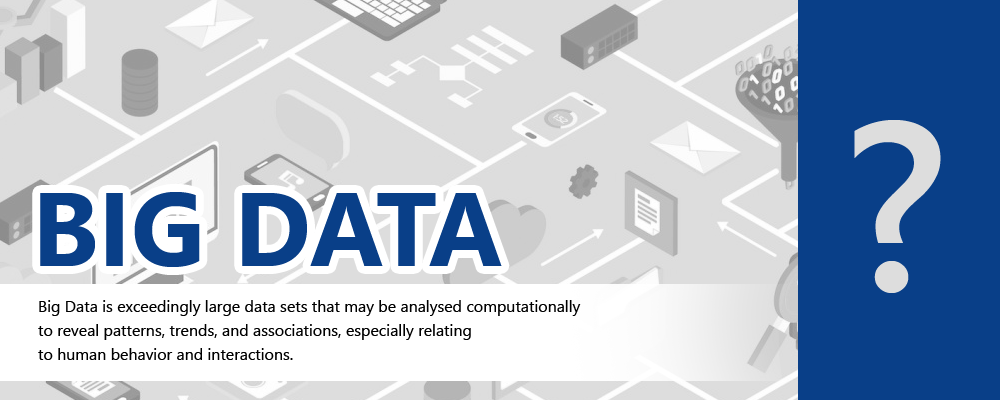- December 6, 2016
- Posted by: papasiddhi
- Category: Big Data

Big Data is exceedingly large data sets that may be analysed computationally to reveal patterns, trends, and associations, especially relating to human behavior and interactions.
Much IT investment is going towards managing and maintaining big data the act of gathering and storing large amounts of information for eventual analysis is relatively new which is known as the term “Big Data”.
When an industry analyst Doug Laney articulated the now-mainstream definition of big data as the three Vs:
Variety: From structured, numeric data in traditional databases to unstructured text documents, email, video, audio, stock ticker data and financial transaction such types of data comes.
Velocity: At an unprecedented speed data streams in and must be dealt with in a timely manner. RFIG tags, sensors and smart metering are driving the need to deal with torrents of data in near- real time.
Volume: Including business transactions, social media and information from media and information from sensor or machine-to-machine data and from a variety of sources organizations collect data.
Who uses big data?
In Every industry practically, organizations across are affected by Big Data. From this onslaught of information see how each industry can be benefited.
- Banking
- Education
- Government
- Manufacturing
Banking: Banks are faced with finding new and innovative ways to manage big data, with large amounts of information streaming in. As important it is to do less the risks and fraud while maintaining regulatory compliance, it is equally important to understand customers and boost their satisfaction. Big Data requires financial institutions to stay one step ahead of the game with advanced analytics along with it brings big insights.
Education: It is a good chance for educators with data-driven insight to make a significant impact on school systems, students and curriculum’s. They can implement a better system for evaluation and support of teachers and principals also they can even identify at-risk students are making adequate progress by analyzing big data.
Government: When it comes to managing utilities, running agencies, dealing with traffic congestion or preventing crime they gain significant ground when government agencies are able to harness and apply analytics to their big data. Governments must also address issues of transparency and privacy though there are many advantages to big data.
Manufacturing: While minimizing waste-processes that are key in today’s highly competitive market, manufacturers can boost quality and output armed with insight that big data can provide. To solve problems faster and make more agile business decisions manufacturers are working in an analytics-based culture.
How it works?
You should first understand from where it comes, before discovering how big data can work for your business.
Generally the sources from big data fall into one of the below categories:
Streaming data: From a web connected devices data that reaches your IT is included by this category. You can make decisions on what data to keep, what not to keep and what requires further analysis and you can too analyse this data as it arrives.
Social media data: Particularly for marketing, sales and support functions the data on social interactions is an increasingly attractive set of information. When it comes to consumption and analysis it often in unstructured and semi-structured forms.
To research the technologies that help you make the most of big data and big data analytics is the final step in making big data work for your business.
4 Comments
Leave a Reply
You must be logged in to post a comment.

Understanding the business impact of Big Data and its advantages will help company leaders to make right decisions and drive performance. The research guarantees a growing hunger for data and data-driven decisions and those who apply these correctly stay ahead of the game. The report says perception on their use of Big Data today and in the future and main advantages are seen and the exact challenges Big Data has on decision making for business heads. By 2020, all businesses will be digital businesses. As ones and zeros swallow the world data will become the new product and business intelligence—finds the needle in a haystack—will be the new process of transformation.
Hi, thank you very much for this info!
Hi,
Thanks for sharing such a nice article with us on Big Data for better decisions with a nice explanation
Thank you
Welcome sir